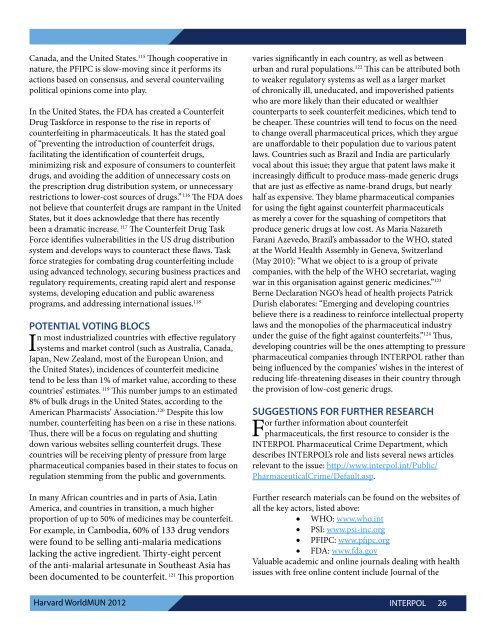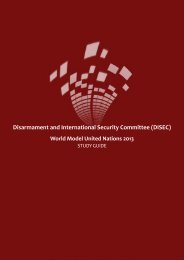INTERPOL - World Model United Nations
INTERPOL - World Model United Nations
INTERPOL - World Model United Nations
You also want an ePaper? Increase the reach of your titles
YUMPU automatically turns print PDFs into web optimized ePapers that Google loves.
Canada, and the <strong>United</strong> States. 115 ough cooperative in<br />
nature, the PFIPC is slow-moving since it performs its<br />
actions based on consensus, and several countervailing<br />
political opinions come into play.<br />
In the <strong>United</strong> States, the FDA has created a Counterfeit<br />
Drug Taskforce in response to the rise in reports of<br />
counterfeiting in pharmaceuticals. It has the stated goal<br />
of “preventing the introduction of counterfeit drugs,<br />
facilitating the identication of counterfeit drugs,<br />
minimizing risk and exposure of consumers to counterfeit<br />
drugs, and avoiding the addition of unnecessary costs on<br />
the prescription drug distribution system, or unnecessary<br />
restrictions to lower-cost sources of drugs.” 116 e FDA does<br />
not believe that counterfeit drugs are rampant in the <strong>United</strong><br />
States, but it does acknowledge that there has recently<br />
been a dramatic increase. 117 e Counterfeit Drug Task<br />
Force identies vulnerabilities in the US drug distribution<br />
system and develops ways to counteract these aws. Task<br />
force strategies for combating drug counterfeiting include<br />
using advanced technology, securing business practices and<br />
regulatory requirements, creating rapid alert and response<br />
systems, developing education and public awareness<br />
programs, and addressing international issues. 118<br />
POTENTIAL VOTING BLOCS<br />
In most industrialized countries with eective regulatory<br />
systems and market control (such as Australia, Canada,<br />
Japan, New Zealand, most of the European Union, and<br />
the <strong>United</strong> States), incidences of counterfeit medicine<br />
tend to be less than 1% of market value, according to these<br />
countries’ estimates. 119 is number jumps to an estimated<br />
8% of bulk drugs in the <strong>United</strong> States, according to the<br />
American Pharmacists’ Association. 120 Despite this low<br />
number, counterfeiting has been on a rise in these nations.<br />
us, there will be a focus on regulating and shutting<br />
down various websites selling counterfeit drugs. ese<br />
countries will be receiving plenty of pressure from large<br />
pharmaceutical companies based in their states to focus on<br />
regulation stemming from the public and governments.<br />
In many African countries and in parts of Asia, Latin<br />
America, and countries in transition, a much higher<br />
proportion of up to 50% of medicines may be counterfeit.<br />
For example, in Cambodia, 60% of 133 drug vendors<br />
were found to be selling anti-malaria medications<br />
lacking the active ingredient. irty-eight percent<br />
of the anti-malarial artesunate in Southeast Asia has<br />
been documented to be counterfeit. 121 is proportion<br />
varies signicantly in each country, as well as between<br />
urban and rural populations. 122 is can be attributed both<br />
to weaker regulatory systems as well as a larger market<br />
of chronically ill, uneducated, and impoverished patients<br />
who are more likely than their educated or wealthier<br />
counterparts to seek counterfeit medicines, which tend to<br />
be cheaper. ese countries will tend to focus on the need<br />
to change overall pharmaceutical prices, which they argue<br />
are unaordable to their population due to various patent<br />
laws. Countries such as Brazil and India are particularly<br />
vocal about this issue; they argue that patent laws make it<br />
increasingly dicult to produce mass-made generic drugs<br />
that are just as eective as name-brand drugs, but nearly<br />
half as expensive. ey blame pharmaceutical companies<br />
for using the ght against counterfeit pharmaceuticals<br />
as merely a cover for the squashing of competitors that<br />
produce generic drugs at low cost. As Maria Nazareth<br />
Farani Azevedo, Brazil’s ambassador to the WHO, stated<br />
at the <strong>World</strong> Health Assembly in Geneva, Switzerland<br />
(May 2010): “What we object to is a group of private<br />
companies, with the help of the WHO secretariat, waging<br />
war in this organisation against generic medicines.” 123<br />
Berne Declaration NGO’s head of health projects Patrick<br />
Durish elaborates: “Emerging and developing countries<br />
believe there is a readiness to reinforce intellectual property<br />
laws and the monopolies of the pharmaceutical industry<br />
under the guise of the ght against counterfeits.” 124 us,<br />
developing countries will be the ones attempting to pressure<br />
pharmaceutical companies through <strong>INTERPOL</strong> rather than<br />
being inuenced by the companies’ wishes in the interest of<br />
reducing life-threatening diseases in their country through<br />
the provision of low-cost generic drugs.<br />
SUGGESTIONS FOR FURTHER RESEARCH<br />
For further information about counterfeit<br />
pharmaceuticals, the rst resource to consider is the<br />
<strong>INTERPOL</strong> Pharmaceutical Crime Department, which<br />
describes <strong>INTERPOL</strong>’s role and lists several news articles<br />
relevant to the issue: http://www.interpol.int/Public/<br />
PharmaceuticalCrime/Default.asp.<br />
Further research materials can be found on the websites of<br />
all the key actors, listed above:<br />
!" WHO: www.who.int<br />
!" PSI: www.psi-inc.org<br />
!" PFIPC: www.ppc.org<br />
!" FDA: www.fda.gov<br />
Valuable academic and online journals dealing with health<br />
issues with free online content include Journal of the<br />
Harvard <strong>World</strong>MUN 2012 <strong>INTERPOL</strong> 26

















